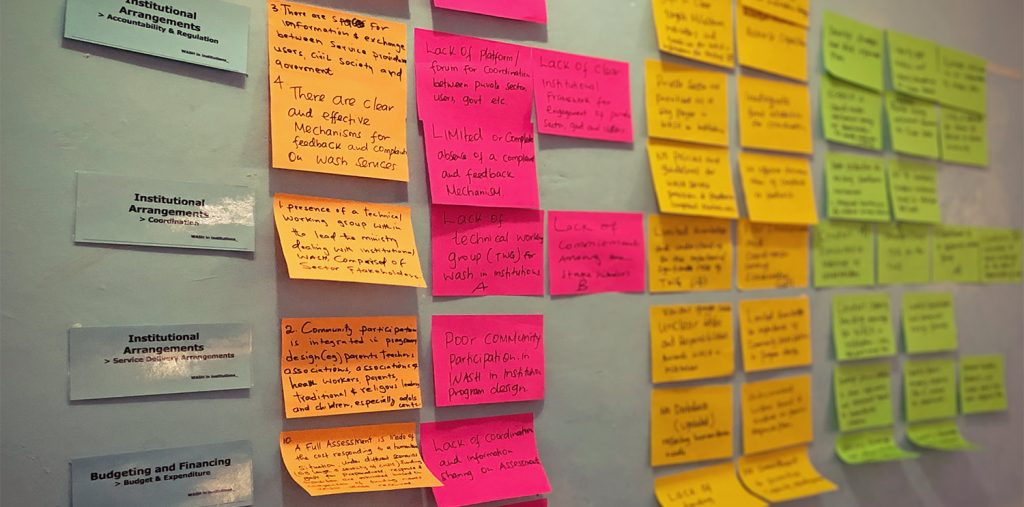heading
PROJECT: UNDP-SIWI WATER GOVERNANCE FACILITYKnowledge Management Strategy on Democratic Economic Governance (DEG-KM)
The purpose of the knowledge management (KM) strategy implemented by the WGF was to document, analyze and disseminate innovations and lessons learnt from 11 national programmes working with democratic and economic governance in the water supply and sanitation sector. The national programmes were carried out jointly by UN agencies, governments and CSOs and financed by the Millennuim Development Goals Achievement Fund (MDG-F).

The goals of this project are to document, analyse and disseminate experiences, insights and lessons learnt from 11 water supply and sanitation governance programmes to:
- Catalyse cross-learning between the programmes to strengthen their implementation
- Increase the global knowledge base on how to improve access to water and sanitation services through more democratic and sustainable governance.
Challenge
Water governance is the set of social relations or system that determines who gets what water/services, when and how. ‘Good governance’ in the water supply and sanitation sectors is thus crucial for improving access to water and sanitation services.
Yet, water and sanitation development often focus heavily on infrastructure investments, overlooking the importance of also investing in the capacities and institutions at national, regional and local level responsible for delivery, governance and maintenance of the services. As a result, infrastructure solutions are underutilized, poorly managed and unsustainable. Water and sanitation services also often fail to reach poor and marginalized groups hence democratization of the governance processes through increased participation, transparency and accountability is key.
To avoid this, capacities about how to integrate strategies to strengthen governance in infrastructure investments need to be developed and applied. Unfortunately many organizations and institutions lack the mechanisms and incentives to foster internal continuous learning that would enable them to take advantage of the knowledge and lessons learnt that exist among their own staff – much less, are able to share that knowledge to the benefit of other actors.
Opportunity
The basic premise of knowledge management (KM) is the view that knowledge – what we know – is a key driver of successful performance.
Most knowledge is gained through experience, i.e. learning by doing. As we learn by doing, the knowledge about what, how and why to do is often embodied in individuals, organizations and the practices they engage in. Knowledge management is the process of capturing and documenting the knowledge and experiences so they can shared and absorbed by others. It is also crucial to focus on the contextualisation and adaptation of findings to enable the application of lessons learned from one setting to another.
Key lessons learnt from the knowledge management work include:
- Knowledge Management must be planned, structured and provided with sufficient resources so that it can be integrated throughout the project cycle.
- To effectively share knowledge a secure learning environment with space for questioning and reflection is required.
- Knowledge management takes time and can easily be overlooked, but when it is applied it brings great returns.
Strategy
The Democratic Economic Governance Knowledge Management strategy consisted of three main components:
- Knowledge capturing and documentation through collection of valuable experiences from the programme implementation; case studies of successful programme strategies; research and progress reports, and; videos of good practices.
- Knowledge sharing between the governance programmes during two Knowledge Management workshops – one in Manta, Ecuador in March 2011 and one in Stockholm, Sweden in August 2012. While the first workshop focused on the programmes’ mid-term achievements and valuable experience, the second workshop analysed the programmes’ joint contribution towards the achievement of the MDG 7 – with particular attention on their work with marginalized groups; human rights based approaches (HRBAs); and sector coordination.
- Dissemination and communication of the valuable experiences, results and insights from the programmes to target audiences and the general public through the website and a Wiki; World Water Week presentations and publication launch, and a Teamworks virtual platform.